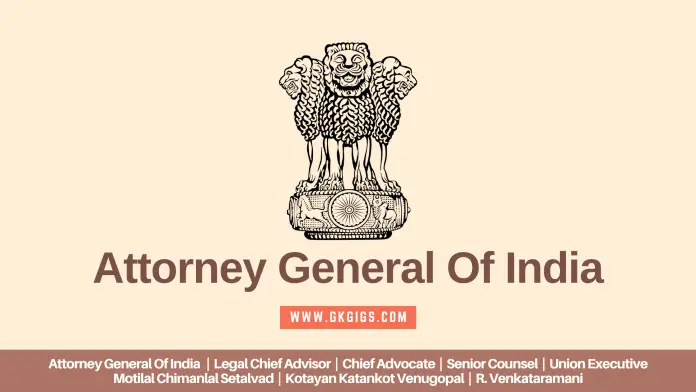
Last Updated: 6 March 2023
The Attorney General of India is the Indian Government’s Chief Legal Advisor and is its Chief Advocate in the Courts. The Current and Incumbent Attorney General of India is R. Venkataramani.
R. Venkataramani succeeded the office as the 16th Attorney-General on 1st October 2022 (14th Individually). His predecessor was Kotayan Katankot Venugopal who left office on 30th September 2022.
Justice R. Venkataramani was appointed as a Member of the Law Commission of India in 2010. He has been appearing for the State of Tamil Nadu as a Special Senior Counsel for the past 12 years and also acting as Special Senior Counsel for the State of Andhra Pradesh.
Page Contents
Attorney General Of India At A Glance
| No. | Header | Details |
|---|---|---|
| 1 | Holder | R. Venkataramani |
| 2 | Type | Judiciary of India |
| 3 | Abbreviation | AGI |
| 4 | Residence | New Delhi, India |
| 5 | Appointer | President of India on the advice of the Union Cabinet |
| 6 | Term Length | As Per the Discretion of the President |
| 7 | Constituting Instrument | Article 76 of the Constitution |
| 8 | Formation | 28 January 1950 |
| 9 | First holder | M. C. Setalvad |
| 10 | Deputy | Solicitor General of India |
Who Is The Attorney General Of India?
- Article 76 of the Indian Constitution mentions that He/She is the highest Law Officer in India.
- As a Chief Legal Advisor to the government of India, he advises the Union Government on all Legal Matters.
- They also perform Legal Duties assigned to them by the President.
- Attorney General represents the Government of India in any reference made by the President to the Supreme Court under Article 143 of the Constitution.
- He/She also is the primary lawyer representing the Union Government in the Supreme Court of India.
Who Appoints The Attorney General Of India?
The President of India appoints the Attorney General of India. They are appointed by the President of India at the instance of the Union Cabinet under Article 76(1) of the Constitution and hold office at the pleasure of the President.
What Are The Qualifications Of The Attorney General Of India?
- He/She should be an Indian Citizen.
- They must be a person qualified to be appointed as a Judge of the Supreme Court.
- They must have been a judge of a High Court for 5 years or an advocate of a High Court for 10 years or an eminent jurist in the opinion of the President.
What Is the Term Of The Attorney General Of India?
There is no fixed term for the Attorney General of India. The Constitution mentions no specified tenure of the AG of India. Similarly, the Constitution also does not mention the procedure and grounds for his removal.
What Are The Powers Of The Attorney General?
- The Attorney General is necessary for advising the Government of India on Legal Matters referred to them.
- They also perform Legal Duties assigned to them by the President.
- The Attorney General has the right to audience in all Courts in India as well as the right to participate in the proceedings of the Parliament, though Not to Vote.
- The Attorney General appears on behalf of the Government of India in all cases (including Suits, Appeals, and Other Proceedings) in the Supreme Court in which the Government of India is concerned.
- Attorney General represents the Government of India in any reference made by the President to the Supreme Court under Article 143 of the Constitution.
- The Attorney General (AG) is not a Government Servant and is not debarred from Private Legal Practice.
- The Attorney General is assisted by a Solicitor General and Additional Solicitors General.
What Are The Limitations Of The Attorney General Of India?
- Unlike the Attorney General of the United States, the Attorney General of India has no Executive Authority. (Those functions are performed by the Law Minister of India)
- The Attorney General can accept briefs but cannot appear against the Government.
- Attorney General cannot defend an accused in criminal proceedings.
- He should not accept an appointment as a Director in any Company or Corporation without the permission of the Government of India.
- The Attorney General is to be consulted only in legal matters of real importance and only after the Ministry of Law has been consulted.
List Of Attorney General Of India
| No. | Attorney General | Term In | Term Out | Tenure | Prime Minister |
|---|---|---|---|---|---|
| 1 | Motilal Chimanlal Setalvad | 28 Jan 1950 | 01 Mar 1963 | 13 Years 32 Days | Jawaharlal Nehru |
| 2 | Chander Kishan Daphtary | 02 Mar 1963 | 30 Oct 1968 | 5 Years 242 Days | Jawaharlal Nehru + Lal Bahadur Shastri |
| 3 | Niren De | 01 Nov 1968 | 31 Mar 1977 | 8 Years 150 Days | Indira Gandhi |
| 4 | S. V. Gupte | 01 Apr 1977 | 08 Aug 1979 | 2 Years 129 Days | Morarji Desai |
| 5 | Lal Narayan Sinha | 09 Aug 1979 | 08 Aug 1983 | 3 Years 364 Days | Charan Singh + Indira Gandhi |
| 6 | Keshava Parasaran | 09 Aug 1983 | 08 Dec 1989 | 6 Years 121 Days | Indira Gandhi + Rajiv Gandhi |
| 7 | Soli Jehangir Sorabjee | 09 Dec 1989 | 02 Dec 1990 | 358 days | V. P. Singh + Chandra Shekhar |
| 8 | G. Ramaswamy | 03 Dec 1990 | 23 Nov 1992 | 1 Year 356 Days | Chandra Shekhar + P. V. Narasimha Rao |
| 9 | Milon Kumar Banerji | 24 Nov 1992 | 08 Jul 1996 | 3 Years 227 Days | P. V. Narasimha Rao |
| 10 | Ashok Desai | 09 Jul 1996 | 06 Apr 1998 | 1 Year 272 Days | H. D. Deve Gowda + Inder Kumar Gujral |
| (7) | Soli Jehangir Sorabjee | 07 Apr 1998 | 04 Jun 2004 | 6 Years 58 Days | Atal Bihari Vajpayee |
| (9) | Milon Kumar Banerji | 05 Jun 2004 | 07 Jun 2009 | 5 Years 3 Days | Manmohan Singh |
| 11 | Goolam Essaji Vahanvati | 08 Jun 2009 | 11 Jun 2014 | 5 Years 3 Days | Manmohan Singh |
| 12 | Mukul Rohatgi | 19 Jun 2014 | 18 Jun 2017 | 2 Years 364 Days | Narendra Modi |
| 13 | Kotayan Katankot Venugopal | 01 Jul 2017 | 30 Sep 2022 | 5 Years 91 Days | Narendra Modi |
| 14 | R. Venkataramani | 01 Oct 2022 | ~ | ~ | Narendra Modi |
Facts About The Attorney General Of India
- He is the highest law officer in India.
- He can be part of any Court in the Indian Territory.
- The Attorney General of India is a part of the Union Executive.
- He has the right to speak and to take part in the proceedings of both Houses of Parliament.
- He has no right to vote when he participates in the proceedings of the Indian Parliament.
- The Attorney General is not considered a Government Servant.
- The Attorney General is not debarred from Private Legal Practice.
Fee And Allowances Of Law Officers
| No. | Nomenclature of the Item of Work | Rates of Fees Payable for Appearance & Work |
|---|---|---|
| 1 | Suits, Writ Petitions, Appeals, and References Under Article 143 | ₹16,000/- per case per day |
| 2 | Special Leave Petitions and other Applications | ₹5,000/- per case per day |
| 3 | Settling Pleadings (including Affidavits) | ₹5,000/- per pleading |
| 4 | Settling Statement of Case | ₹6,000/- per case |
| 5 | For Giving Opinions in Statements of Cases sent by the Ministry of Law | ₹10,000/- per case |
| 6 | For written submission before the Supreme Court, High Court, and Commissions of Inquiry or Tribunals and the like | ₹10,000/- per case |
| 7 | Appearance in Courts outside Delhi | ₹40,000/- per day per case |
In addition to the above fee payable for cases, a retainer fee is paid to the Attorney General for India, the Solicitor General of India, and the Additional Solicitors General at the rate of ₹50,000, ₹40,000, and ₹30,000 per month, respectively. Moreover, the AG of India is also paid a sumptuary allowance of ₹4,000 per month, except during the period of his leave.
Questions On Attorney General Of India
Answer: R. Venkataramani
Answer: Motilal Chimanlal Setalvad
Answer: R. Venkataramani
Answer: President of India
Answer: Kotayan Katankot Venugopal
Answer: Tushar Mehta (Since 11 Oct 2018)
Answer:
1) The Attorney General has the right to audience in all Courts in India as well as the right to participate in the proceedings of the Parliament, though not to vote.
2) The Attorney General appears on behalf of the Government of India in all cases (including suits, appeals, and other proceedings) in the Supreme Court in which the Government of India is concerned.
3) They represent the Government of India in any reference made by the President to the Supreme Court under Article 143 of the Constitution.
Answer: 16 Attorney Generals
Answer: 14 Attorney Generals
Answer: 2 Individuals (Soli Jehangir Sorabjee & Milon Kumar Banerji)
Judiciary Of India
| No. | Header | Details |
|---|---|---|
| 1 | Administration | Ministry of Law and Justice A) Department of Legal Affairs B) Legislative Department C) Department of Justice D) Law Commission of India |
| 2 | Civil Courts | Supreme Court of India A) Chief Justice of India B) Judges of the Supreme Court High courts of India A) Chief justices of High Courts B) Judges of High Courts District courts of India |
| 3 | Criminal Courts | Supreme Court of India A) Chief Justice of India B) Judges of the Supreme Court High Courts of India A) Chief Justices of High Courts B) Judges of High Courts Sessions Courts A) Courts of Judicial Magistrate of First Class B) Courts of Judicial Magistrate of Second Class |
| 4 | Courts of Executive Magistrates | A) Courts of Divisional Commissioners B) Courts of District Magistrates C) Courts of Sub-Divisional Magistrates |
| 5 | Legal Profession | A) Bar Council of India B) Attorney General of India C) Solicitor General of India D) Additional Solicitors General E) Advocates General |
| 6 | Legal Education | A) Autonomous Law Schools in India B) List of Law Schools in India |
| 7 | Others | 1) Alternative Dispute Resolution A) Lok Adalat B) Village Courts 2) Constitution of India A) Basic Structure B) Directive Principles C) Fundamental Duties D) Fundamental Rights 3) Indian Penal Code A) Civil Procedure Code B) Criminal Procedure Code 4) Judicial activism in India National Judicial 5) Appointments Commission Supreme Court Collegium |
| Read Interesting Articles |
- Canada’s Prime Minister (2023 Updated)
- List Of Chief Justice Of India (2023 Updated)
- List Of Female Governors In India (2023 Updated)
- Order Of Precedence In India With PDF (2023 Updated)
- 100+ GK On Mahatma Gandhi: Life, Family, Career, Movements












